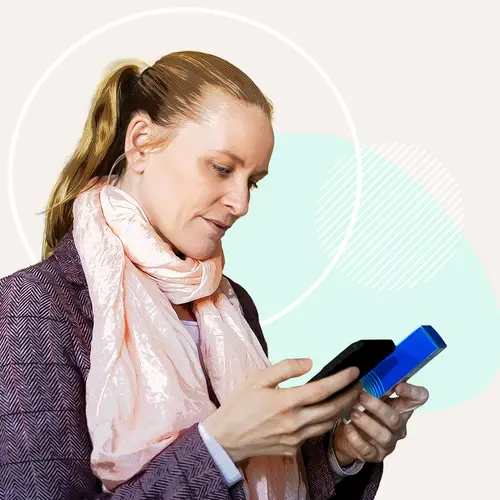May 2, 2024 -- Rebecca Levy-Gantt, DO, says many of her patients going through menopause first turn to social media to relieve various symptoms. Which is how she keeps up to date in the world of supplements and other products with little if any actual medical benefit:
The ever-growing list of patches, collagen gummies, or even infrared mats designed to “recharge” a patient’s body through electromagnetic pulses marketed as miracle cures for the woes of menopause.
Even more concerning to Levy-Gantt, an OB/GYN and menopause specialist in Napa, CA, are products containing ingredients that may interact badly with other medications or are prescribed without the complete medical history of her patients.
“I have told people that when they see, hear, or someone tells them they can ‘fix’ menopause, they have to be more skeptical,” Levy-Gantt said. “It seems like a lot of people want to ‘do’ menopause, there's all these” products, services, and marketing gimmicks popping up online.
More than 1 million people go through menopause each year. And in 2024, how-to advice on managing the condition is a big business, rife with overpriced therapies and false promises. Social media is the gateway to much of that misinformation, and women are increasingly turning to this medium for help.
Primary care clinicians can help patients think critically about the motives of online influencers, parse through an abundance of questionable information, and extract the science from the hype, experts said.
After the Fact
Several of Levy-Gantt’s patients purchased hormone products touted on social media and online ads through virtual health providers, and subsequently developed uncontrolled menstrual bleeding, she said. Others received estrogen-only products despite having a uterus, risking estrogen-associated endometrial hyperplasia, and increasing their risk of uterine cancer. Menopausal patients with uteruses should take combination estrogen-progestin therapy, according to clinical guidelines.
Other patients were swayed by influencers promoting the benefits of testosterone to improve libido and obtained high doses of the hormone through online clinicians. Too much of this drug can lead to side effects like weight gain, nausea, or increased cholesterol. Some patients consult her before going the telemedicine-only route, like in the case of a woman who requested a medication for menopause that would have greatly increased her risk of stroke and even death.
“What scares me the most is, if she didn't come to me but instead, she found someone online to prescribe it for her, without knowing her full health history,” Levy-Gantt said.
Patients assume the same treatment will work for them because a friend or celebrity on social media raved about it, Levy-Gantt said.
While open to considering options with more limited clinical evidence, she tries to educate her patients about finding reputable sources of information.
Patient confusion about which health information to trust is understandable, according to Monica Wang, a doctor of science and associate professor of community health sciences at the Boston University School of Public Health. Clinicians can acknowledge the deluge of information and ask patients about their current understanding of a particular topic or treatment. They might use plain English and culturally-appropriate language to dispel misinformation.
Menopause influencers often promote expensive supplements or special diets, which are among the most common sources of health misinformation that circulates online, Wang said. Patients should be wary about online promotion of supplements, especially if products are touted by a celebrity, if they are ordered from another country, or if the company does not make clear that it has safety or quality control controls.
Even therapies that seem healthy can be harmful if taken in large quantities or if a patient has an underlying condition. Misinformation or questionable solutions from other medical professionals is especially hard to dispel, Levy-Gantt said.
Green tea, known for its antioxidant properties and ability to reduce inflammation, can be helpful for some menopausal women. But consuming large doses of green tea extract, often sold in supplement form, has been linked to liver toxicity and liver failure. Some reports link black cohosh, a popular herbal remedy for hot flashes, to liver problems. Dong quai, a traditional Chinese herbal remedy for hot flashes, should not be taken by women with fibroids, hemophilia, and other clotting problems, according to The Menopause Society.
Ask Your Doctor
Women may find misinformation because they have symptoms that their primary care clinicians dismiss or ignore, according to Levy-Gantt.
Jewel Kling, MD, MPH, chair of the Division of Women's Health Internal Medicine at Mayo Clinic in Scottsdale, AZ, keeps a list on hand of menopause influencers who are providing accurate information and tips because “there are some people that are doing a beautiful job,” she said.
Doctor-patient encounters are often subject to time constraints, but ask your doctor to continue conversations through follow-up visits or calls, portal messaging, or ask if they can tap team members like nurses or physician assistants to schedule a separate consultation for additional questions.

